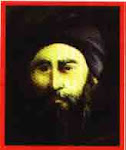-3-
METAPHYSICAL COSMOLOGY
RELATION OF GOD TO THE WORLD
That God exists is a proven truth; that the world was made is another truth. The most arduous question, however, which man tries to solve is this: What relation is there between God and the world, the Infinite and the finite? What connection is there between God and matter? Is there a bridge thrust from one side to the other over which God might pass to give matter a determinate form? The dualism of spirit and matter, infinite and finite, constitutes the cosmological problem of Metaphysics. In an effort to explain the action of God on matter, Alfarabi placed the intellects of the Spheres between God and the world. Thus, he made the many proceed from the One by emanation. His theory is as follows:
From the First Being (the One) comes forth the first intellect called the First Caused. From the first intellect thinking of the First Being flows forth a second intellect and a sphere. From the second intellect proceeds a third intellect and a sphere. The process goes on in necessary succession down to the lowest sphere, that of the moon. From the moon flows forth a pure intellect, called active intellect. Here end the separate intellects, which are, by essence, intellects and intelligibles. Here is reached the lower end of the supersensible world (the world of ideas of Plato).
These ten intellects, together with the nine spheres, constitute the second principle of Being. The active intellect, which is a bridge between heaven and earth, is the third principle. Finally matter and form appear as the fifth and sixth principles, and with these is closed the series of spiritual existences.
p. 31
Only the first of these principles is unity, while the others represent plurality. The first three principles, God, the intellects of the spheres and the active intellect, remain spirit per se, namely, they are not bodies, nor are they in direct relation with bodies; neither are the last three (soul, form, matter) bodies by themselves, but they are only united to them.
There are six kinds of bodies: the celestial, the rational animal, the irrational animal, the vegetal, the mineral and the four elements (air, water, fire, earth). All of these principles and bodies taken together make up the universe. 79
The theory of separate intellects such as taught by Alfarabi and other Arabian philosophers is simply a mixture of Aristotelian theories on the motion of heavenly spheres (Met. XII, cap. 7 and 8) and of the neo-Platonic doctrine of emanation. The student of philosophy may be surprised to hear such a strange and ridiculous theory. But, should he delve into its origin, he would certainly find that the belief in the animation of stars is just a particular case of what men formerly believed, namely, the animation of nature.
ETERNITY OF MATTER AND ETERNITY OF THE WORLD
Alfarabi firmly believed that the world is the workmanship of an eternal, intelligent being; and thus God is the first principle or the efficient cause. He also believed that God, in order to make the world, must have had materials to work upon. From this he inferred that an eternal, uncreated matter must have been the material cause of the universe. But this matter, he believed,
p. 32
had no form, though it contained many forms in potentiality. This is what he says:
When people say that God created the world, they simply mean that God produced the world out of matter by clothing it with a determinate form. The world is certainly God's work, and though it comes after Him as a world-form, yet it is equal to Him in time or eternal, insofar as He could not begin to work on it in time. The reason for this is that God is to the world exactly what a cause is to its effect. Since the cause in this case is inseparable from the effect, it follows that He could not, in a given moment, start making it. For, if He could, that would simply imply imperfection on His part while He had been trying to achieve His goal. This, of course, is incompatible with the absolute perfection of God. 80
The eternity of the world and of matter as held by Alfarabi and Avicenna was rejected by Averroes and Maimonides, who taught the "creatio mundi ex nihilo." From the latter St. Thomas borrowed the proposition that the world was created from nothing.
DUALISM OF GOOD AND EVIL
According to neo-Platonists, the dualism of spirit and matter gives rise to the existence of two principles, the principle of good and the principle of evil. For them, evil is linked with matter. Fortunately, the neo-Platonic teaching on this problem did not have much influence on Alfarabi. For, he says:
God's providence is exercised over all things. Hence, whatever happens in the world is not to be attributed to chance. Evil is under divine control and is united to corruptible things. That evil exists in the world is good accidentally, because if it did not exist, a great deal of good in the world would never come about. 81
In conclusion, it should be noted that Alfarabi's Metaphysical
p. 33
[paragraph continues] Cosmology is not original at all, but rather it is a mixture of Aristotelian theories (motion of the spheres, eternity of matter) and of neo-Platonic emanation.
p. 34
Subscribe to:
Post Comments (Atom)











No comments:
Post a Comment